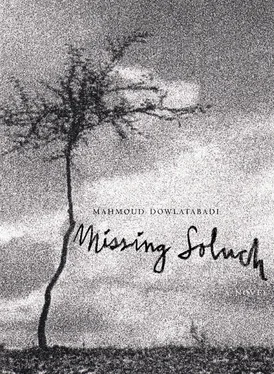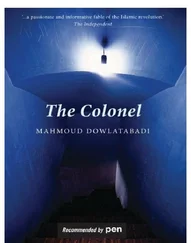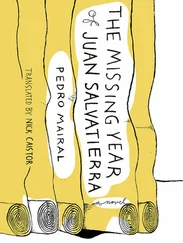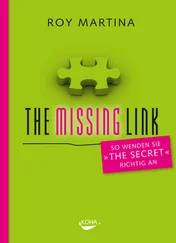“So, you little rat, should I suffocate you? You’re too weak to even stand on your feet, so why are you throwing yourself into the arena? Now go get lost!”
Abbas rose from Abrau’s chest, threw a blanket over him, and then turned toward Hajer. She ran and reached the alley. She screamed and ran toward the house of Ali Genav’s mother. Abbas decided not to start a commotion in the night. He turned back and sat in the doorway.
Now it was Abrau who had disappeared. He wasn’t to be found anywhere. Maybe he had slid away, ashamed of himself. That is what Abbas presumed. He wanted to find him to explain why he hadn’t whipped Hajer unjustifiably.
He said, “Mother and daughter, they’re working together. Just when our attention was elsewhere, they went and hid the copper somewhere. Do you see? Are you listening? They took four pieces of good copper work and have lost them somewhere. Somewhere only they know. Just themselves! The little one is working with Mama. She won’t open her lips for a second. But you …”
Abrau didn’t respond. He didn’t have the heart. He didn’t want to show his face. He hid himself under a blanket. But Abbas was worked up. He couldn’t let go. He rose, stuck his head outside the door, and shouted, “Hey … if you don’t want me to give you a beating, come back to the house yourself. Get up and come back. I won’t do anything … Where the hell are you? Hey … I’m speaking to you. Come on, where are you?”
There was no reply from Hajer. Abbas left the house. He investigated the bread oven and the stables. Hajer was nowhere. He went to the alley. The alley was dark. She was like a cricket, lost in the night; she could be hidden in any corner. So Abbas decided to try to use sweet talk.
“Hey, you little devil! You think I don’t know where you’ve hidden yourself? I can find you, but I’d rather you came out yourself. So come on! I was just kidding around with you, girl! Don’t you know what a joke is? So come on out … Hajer … Hajer … Where are you? Eh? I’m with you, girl!”
Abbas began to worry again. Hajer was stoking his anger. Her sudden silence in the dark night struck his heart with a kind of fear. There was no clear reason for him to worry; nonetheless, for some reason his heart was filled with dread. Something unclear frightened him. Something like the image of Hajer falling into a ditch or a well. So Abbas began to zigzag the cold, hard soil of the alleyway, in bare feet, winding up and then loosening the belt that was still in his hand.
“Where are you, you foolish girl? You want to drive me mad tonight? Come out from whatever hellhole you’ve hidden in. Come out! Why are you all trying to torment me like this? Come out, you daughter of a beast! Hajer … Hajer!”
Hajer was nowhere to be found. It was as if she’d melted into the earth. Abbas, tired and angry, like an injured dog, returned to the room and sat by the stove. Abrau had still not emerged from beneath the blanket. Disconsolate and irritated, Abbas shouted, “Now you’re pretending to be a dead mouse! Get up and let’s see where the hell this girl’s gone off to! Get up!”
Abrau didn’t respond. He didn’t want to reply to his brother. Abbas cut short his fury, wrapped a blanket around his shoulders, and left the house again, saying, “Damn you all. You can all go to hell. Go to hell!”
He went straight toward the bread oven and climbed onto the roof of the structure. He slid over to the edge of the wall and leaned against it. He propped his elbows on his knees and his chin in his hands, and he sat there. He felt like crying. But it was as if his penetrating eyes could only cry blood. So silent and despondent, with sorrow in his throat, he remained in his place with the blanket wrapped tightly around himself.
The dark night and its cold cut like a double-edged knife. He tucked his feet in and wrapped them with the blanket, wiping his nose with the palm of his hand. Pointless anger. Why was he so wound up? He felt something deeper than this commotion was bothering him. Something voiceless had softly pricked his heart. Like a thorn, slowly it cut in, opening a wound more and more as it went. It wasn’t painful; it irritated. He knew it wasn’t deadly, but it was wearing down on him. He could see very clearly that it had made him out of sorts. He’d become rabid, like a dog. His father always used to call him a flame, and said that if he was left in a forest, he’d set the place afire. His father had put all of his efforts into raising Abbas as a mud-plasterer for bread ovens, but Abbas refused to learn. He would always escape. He’d escape and get a beating when he came back at night. Abbas’ grandfather was a reputable mud-plasterer who, in his later years, suffered from a bad back. He couldn’t stand straight. When he walked, he had to keep himself steady by holding onto his knees. He walked in a way that made Abbas think he was just about hit the ground with his face. He wobbled like a broken wheel on a cart.
Abbas didn’t want to follow in his father’s steps. The crooked back of his grandfather — Samad the Plasterer, as he was called — was always in his mind. But he’d thrown himself more into the work of well digging. When Soluch would pick up his spade and pick and go to dig a well in someone’s house, or if he went to open a blocked canal, Abbas would tag along. This work was more interesting to him. Soluch would position Abbas at the top of the well and would descend to the pit of the well himself. Abbas would send down the tools Soluch needed in a bucket. He’d also send down the tallow-burning lantern, the water jug, and bread when the time came. Abbas would lie on an incline of dirt around the well and watch the birds flying in the sky, waiting for Soluch to fill a bucket with dirt. He would sing songs to himself, or toss stones at the reeds. He could stare at the distant wastelands, or watch the road that traversed the surface of the highlands.
“Hooooy …”
This was Soluch’s call rising up from the well. Abbas had to grab the rope and slowly raise the bucket of earth to the surface, empty it, and send it back down to the bottom.
“Hooooy … coming down!”
This was different from the work of replastering bread ovens. Mud-plastering required someone who was dedicated to the job. Someone with patience for hard work. From morning until dusk. It was detailed and careful work, needing full attention and patient dedication. All of which Soluch possessed. In the same way that Soluch was dedicated to this kind of work, Abbas was disheartened by it. During working, Soluch would never say a word. His eyes and hands worked as if he were weaving silk. Abbas, who couldn’t sit still for a moment, didn’t have the patience.
Abbas preferred well digging to plastering, and preferred working as an itinerant salesman to well digging. Traveling with his uncle, buying and selling goods, wandering from place to place. Molla Aman would buy four blocks of sugar, four boxes of tea, ten boxes of safety pins, ten boxes of sewing needles, two mans of hard candy, forty or fifty pieces of gaz candy, and a couple of packs of rice bangles from town, pack them onto the back of his donkey, and head out to the mountainside villages around Mount Kuhsurkh. Once or twice, Abbas went along for the trip on the coattails of his uncle. Afterward, Molla Aman had told his sister Mergan that Abbas wasn’t trustworthy. But Abbas knew there was another reason — Molla Aman couldn’t countenance sharing his life with the son of his sister. Abbas actually respected the fact that his uncle had blamed Abbas for this decision.
Molla Aman had told his sister, “I can’t look away for a moment before your son pockets a couple of seer of hard candy and hides the take in his bag. And he’s got a thing for deal making … and worse, he’d take a few hair clips or bangles and give them away to girls for free. All it would take is for one to smile at him, and he loses his wits. The goods aren’t safe in his hands. He’d even try to steal the sand from the desert! It’s as if I didn’t sweat blood to get those goods in the first place. But my biggest fear was that one day he’d lay a hand on some girl and start a scandal, and a hundred men with sticks and clubs would descend on me in some distant hilltop village. Now that would be just perfect!”
Читать дальше












